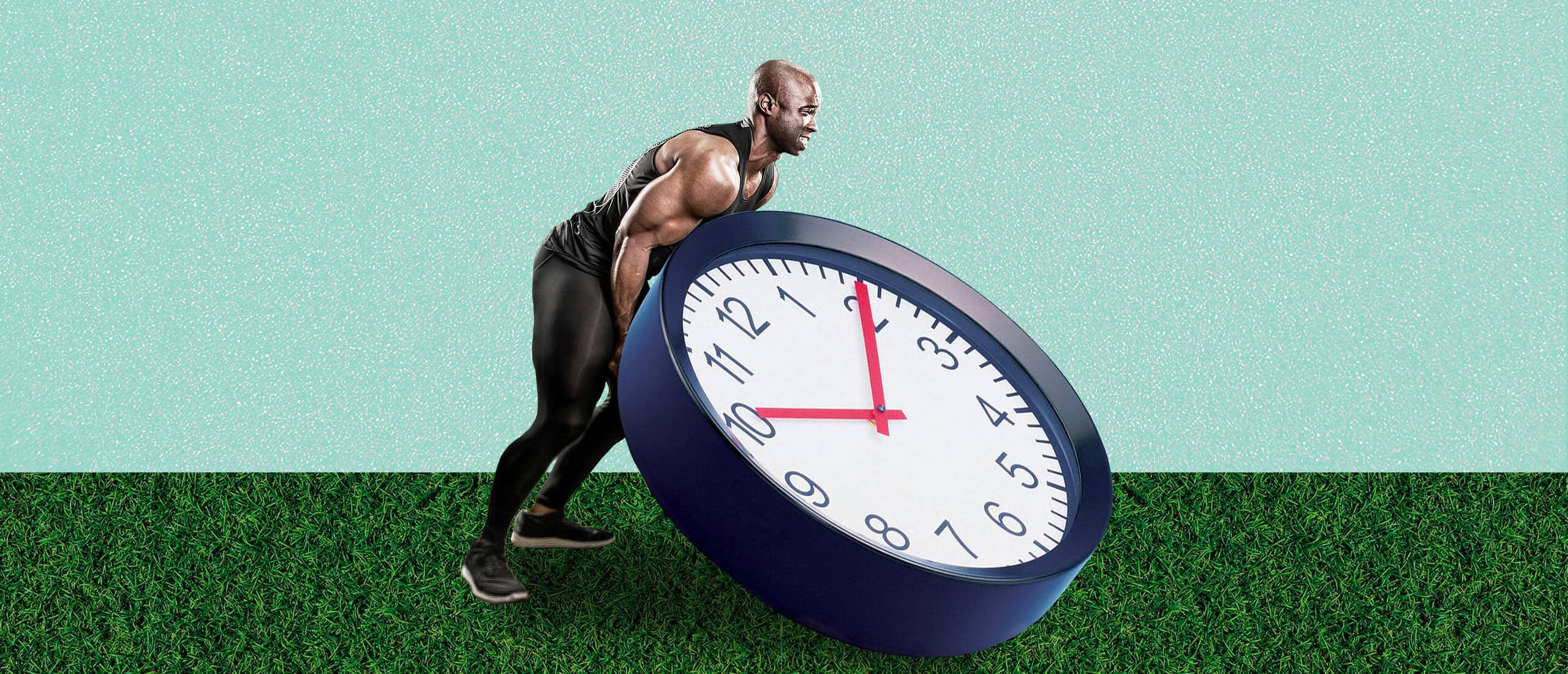Does Intermittent Fasting Increase Testosterone?
Fast Facts
- Intermittent fasting has been linked to health benefits including weight loss and managing type 2 diabetes.
- Some research suggests that IF may also increase testosterone levels.
- A deeper dive into the research suggests that this isn’t the case, and that IF may actually lower T in some men.
Most people try intermittent fasting or IF (restricting your calorie intake to a specific window of hours each day) with one of two goals in mind: weight loss or better health. The evidence is mixed on the former— a new study (1) in the New England Journal of Medicine suggests it’s no better than daily calorie restriction for dropping pounds, though some prior research (2) suggests it can melt fat—and pretty solid on the latter: some research suggests IF may help people manage type 2 diabetes, lower blood pressure, curb inflammation, and reduce oxidative stress (3, 4, 5, 6).
Several studies have also examined whether IF offers an additional benefit that many men seek: improving testosterone production.
Low Testosterone Levels Are on the Rise
According to findings from the Yale School of Medicine presented at the 2020 American Urological Association Virtual Experience (7), based on data collected between 1999 and 2016, testosterone levels among adolescents and young men had declined during those 15+ years.
With the pandemic exacerbating feelings of fatigue, low sex drive, and general malaise, more and more young men decide to look for ways to boost it—whether through supplements, pharmaceuticals, or lifestyle changes.
And if you were searching for a natural enhancement protocol, some research suggests that IF might be a good option. But Vince Kreipke, Ph.D., owner and founder of Kreipke Research and Consulting, which specializes in helping people optimize their lifestyles through dietary and lifestyle modification, says it’s not so straightforward.
What Is Intermittent Fasting?
Intermittent fasting (IF)—or time restricted eating—is the practice of splitting your day into feeding and fasting windows. During a fasting window, you’ll abstain from eating or drinking anything that contains calories (although some experts debate whether coffee can actually break your fast). When you enter a feeding window, you’ll eat all of your meals for the day.
There’s an seemingly unlimited number of intermittent fasting schedules to choose from. Beginners may opt for an overnight, eight-hour fasting window followed by a 16-hour feeding window. More extreme fasters participate in alternate day or multi-day fasting.
Does IF Boost Testosterone?
Probably not.
“If you really comb through the literature, it does not look like intermittent fasting helps boost testosterone,” says Kreipke.
“People often refer to one particular study (8) from 1989 that looked at both obese and non-obese men. If you only read the abstract, your takeaway would be that after fasting, the lean study subjects responded to a GnRH (Gonadotropin-Releasing Hormone) IV test in an amazing way. I mean, a 180% increase in T levels? Sign me up!!”
But this is often misinterpreted and there are a few essential details that people often miss when discussing this study, says Kreipke.
The first is that each participant was given an injection of GnRH, which basically triggers the biological cascade that leads to testosterone production. Meaning: they were getting an additional boost [of testosterone] to what they were already producing naturally.
“The second detail, buried in the study results, shows the difference between the starting testosterone concentrations and those after 56 hours of fasting. Testosterone levels actually decreased in the non-obese group (from 8.2 to 6 mcg/l) with no change in the obese group (4 v. 3.6 mcg/l). These results reflect findings from prior research (9) by this same team of researchers.”
A meta-analysis (10) released just this year shows similar results over longer periods of time than the 1989 study and with shorter fasting periods.
Checking your T levels is easy with Hone’s at-home assessment. You can knock it out before your AM coffee.
If you have low T, our physicians can help you feel better, fast.
The Truth About Intermittent Fasting and Testosterone
Until June of this year, there was no comprehensive review of studies published on the effects of IF reproductive hormone levels in men (or women).
Previously, the effects of fasting on testosterone levels were studied in four clinical trials. All studies used 8-hour time-restricted eating (TRE) schedules and most combined TRE with resistance training (three times per week). Study participants were physically active, lean, young men.
The findings revealed that TRE, both alone and combined with resistance training, consistently reduced total testosterone levels and free testosterone after 4 to 44 weeks. The reductions in T didn’t appear to be related to how long people followed TRE: Shorter trials produced similar changes in testosterone as the longer ones did.
All results suggest that TRE lowers free and total testosterone levels in lean, physically active, young men.
Why might IF influence T levels? One theory has to do with calories. “Some studies have shown that IF can lead to caloric restriction. When you cut calories, your body may respond to getting fewer nutrients by slowing down hormone production,” says Kreipke. “Researchers are still working on developing theories as to these responses when caloric needs are met,” he adds.
How’d Everyone Get It So Wrong?
Science has yet to establish (let alone confirm) a clear link between intermittent fasting and testosterone due to many compounding factors, says Kreipke. So how did we get here?
Some people just read study abstracts, find an interesting sentence and run with it without any context or comparison to the rest of the literature, says Kreipke. Often it’s our interpretation—or selective choice of information from the research—that is incorrect.
That’s what he thinks happened here. People read the abstract from the 1989 study and grabbed onto that 180% stat and misinterpreted it.
“When most people talk about or interpret these studies, they only focus on the effects of certain variables on other variables (i.e. fasting on testosterone) and do not take into account the other systems of the body and how they respond,” Kreipke says.
If we’re only looking at the effect of intermittent fasting on testosterone levels. What about the rest of the interworkings of the human body? Testosterone doesn’t exist in a vacuum, nor we do operate as siloed mechanisms. Everything has an implication on something else.
Everyone is looking at the new meta-analysis and saying that fasting lowers your T levels, says Kreipke. But even that isn’t the final word.
“The most recent report shows that intermittent fasting seems to decrease testosterone levels in lean, physically active individuals. But if you read further, the authors note: ‘Interestingly, the decreases in the anabolic hormone, testosterone, did not lead to any deleterious body composition changes or compromises in muscular strength.’ They’re suggesting that while participants did see a decrease in testosterone, they did not see the negative effects one would associate with it (i.e., reduced physical performance and lean mass) and did see benefits associated with intermittent fasting (fat loss), which is often what men worry about.”
What About IF for Men Who Are on TRT?
If intermittent fasting might lower testosterone levels, what might it mean for men on testosterone replacement therapy (TRT) to treat a testosterone deficiency?
Kreipke’s best guess is: not much.
“I would not think that IF would interfere with TRT,” he says.
“First, TRT is exogenously administered.” If you were on TRT and your physician noticed a significant fluctuation in your T levels after starting intermittent fasting, they could adjust your levels—just like they would if your testosterone dropped for any other reason.
Also, for most men on TRT, what matters is how they feel, look, and perform. “As we saw in many of the studies IF did not negatively affect muscle mass, fat mass, or exercise performance, even if there was a decrease in testosterone,” says Kreipke.
The Bottom Line
Much more research is required to fully understand how and why intermittent fasting impacts testosterone, says Kreipke. But, based on current research, it does not appear that intermittent fasting will boost testosterone, especially in the short term.
References
1. Liu D, Huang Y, et al. (2022). Calorie Restriction with or without Time-Restricted Eating in Weight Loss.
2. Wilkinson MJ, et al (2020). Ten-Hour Time-Restricted Eating Reduces Weight, Blood Pressure, and Atherogenic Lipids in Patients with Metabolic Syndrome.
3. Albosta, M., Bakke, J. (2021) Intermittent fasting: is there a role in the treatment of diabetes? A review of the literature and guide for primary care physicians.
4. Gabel, Kelsey et al. (2018). Effects of 8-hour Time Restricted Feeding on Body Weight and Metabolic Disease Risk Factors in Obese Adults: A Pilot Study.
5. Mayo Clinic
6. Sutton EF, et al (2018). Early Time-Restricted Feeding Improves Insulin Sensitivity, Blood Pressure, and Oxidative Stress Even without Weight Loss in Men with Prediabetes.
7. Kahl, Kristie L. (2020). Testosterone levels show steady decrease among young US men
8. Röjdmark S, et al (1989). Pituitary-testicular axis in obese men during short-term fasting.
9. Röjdmark S, et al. (1987). Influence of Short-Term Fasting on the Pituitary-Testicular Axis in Normal Men.
10. Cienfuegos S, et al (2022). Effect of Intermittent Fasting on Reproductive Hormone Levels in Females and Males: A Review of Human Trials.














